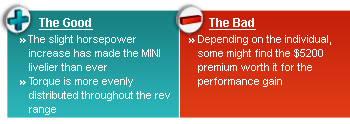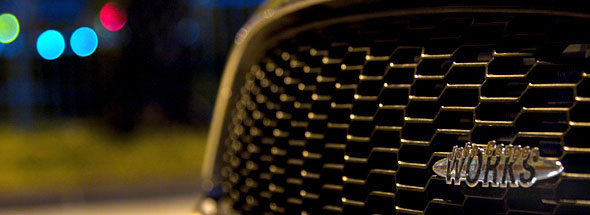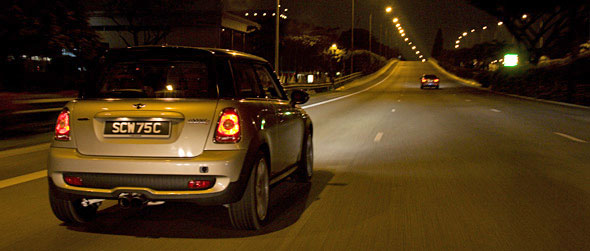MINI Cooper S 1.6 JCW Review
04 Feb 2008|28,008 views
 |
Obviously, aside from bigger exhaust cowlings, John Cooper Works decals have been plastered all over the car, from the front grille to the boot lid, and on top of the air filter - unmistakable signs that differentiate you from "normal" MINI Cooper S-es (pun intended).
Upgrade? Really now™
This latest, turbocharged, R56 Mini Cooper S receives the JCW treatment in the form of a higher-flowing air intake mated to a JCW exhaust optimized for lower back pressure and a sportier sound. The engine control unit (ECU) has been retuned and optimized to yield better throttle response, and nearly 195bhp with over 272 Newton metres worth of torque with overboost, anytime between 1,750-4,500rpm.
Compare these figures to the standard Cooper S' 173bhp and 240Nm after the increase in boost, and you get the big idea. Unfortunately, our test car HAD to come in automatic form.
And then, the MINI enthusiast in yours truly skipped on another vital detail - the previous, John Cooper Works R53 had 12 more horses under the bonnet, so what is the big deal with the new one anyway?
 |
Dig deep
Unlike the R53's JCW kit, the new one is priced to be much, much lower in Stage 1 form with significantly lower installation times needed at the MINI Habitat. MINI insists that customers must purchase JCW tuning kits at their respective dealerships only, an exclusive effort, perhaps.
Only the air-filter housing and a parallel-flow exhaust have been swapped in the name of performance. Tuning the engine of the R56 beyond 195hp, while maintaining the limited warranty status on a new JCW-tuned car would mean the addition of strengthened components, incurring more install time and logically, more cost.
Compare this to the rather complicated, but custom tailored outfit of the R53 JCW Cooper S (revised intercooler, bigger this, larger that, strengthened everything..) and you'll appreciate the maximum gain through simplicity.
MINI claims the best way to market this first stage of tune is the comparison of acceleration times on both the old and new models. On paper, the JCW R56 meets the same 6.5s from 0 to 60 as the 207hp R53 in manual form due to the significantly higher torque at low and medium revs.
Driving Impressions
First up - torque. Loads of it, and this despite being shod with the BMW-ZF 6-speed automatic. Wheelspin favours the careless, so does a flat, meaty torque curve starting from 2,000rpm, going all the way up to the limiter - quick enough to catch us off guard.
Gone is the flat spot where torque seems to disappear in the stock R56 Cooper S - the reason for this rejuvenated feel in acceleration all the way to the redline. Having said that, the disparity in performance between the standard R56 and the JCW S tested here isn't that big. What matters really, is the difference in how and when this tuned MINI applies power to the ground. We prouldly proclaim that entertainment is it's forte.
 |
The engine's ability to rev up and accelerate the car in the first two to three gears is so quick, even the word "effortless" would be wrong. Don't get us wrong. 0-100 km/h in an average of 6.8 seconds (five attempts, tested with half a tank of petrol, air-conditioning off and no passengers) isn't exactly the quickest of way to go in today's realm of crazy fast cars, but mashing your right foot deep into the carpet forcibly accelerates you against your own will. Violent, sort of primitive, and again, amusingly entertaining.
Corners are MINI's given area of expertise, and with the Cooper S' standard suspension setup, this tuned R56 doesn't have a problem coping, and if anything, the extra boost in power has made it even livelier.
It eats through corners with an attitude. A sarcastic shrug, and a mild grumble that it could do with a better driver. The steering isn't as immediate and frantic in feel as the R53's turn in, with the redemption point being better feel at both corner entry and exit, and consequently, more control at the limit.
Given the R56's power hike and an updated DSC (read: traction control), the pilot ninja will expect to feel a little more of that weight transfer at harsh exits. Then he or she will discover that the rear end loves coming out to play, and for the more inclined, fast corners are a pure joy, more so in this car than in the "standard" R56. Keep in mind that there has been a lack of suspension modifications to the JCW R56.
Is it worth it?
Plainly put, the standard MINI Cooper S in automatic guise currently retails for $127,800. The JCW variant goes for $5200 more in base form. What you get are 22bhp worth of gains and most importantly, at least 30 Newton-metres more torque across the tachometer.
There might be cheaper aftermarket tuning solutions, but little offer the simplicity and satisfaction of the R56 John Cooper Works ensemble. From the way the car accelerates to the sound it makes, and the very noticeable gains in power across the rev range, we think it doesn't put a foot out of place when you factor in the cost to performance ratio.
Buy one, and every passenger of yours will walk away feeling on edge for days, and every corner on the road will be scorched, tampered with and raped.
133 grand, you say™
 |
Obviously, aside from bigger exhaust cowlings, John Cooper Works decals have been plastered all over the car, from the front grille to the boot lid, and on top of the air filter - unmistakable signs that differentiate you from "normal" MINI Cooper S-es (pun intended).
Upgrade? Really now™
This latest, turbocharged, R56 Mini Cooper S receives the JCW treatment in the form of a higher-flowing air intake mated to a JCW exhaust optimized for lower back pressure and a sportier sound. The engine control unit (ECU) has been retuned and optimized to yield better throttle response, and nearly 195bhp with over 272 Newton metres worth of torque with overboost, anytime between 1,750-4,500rpm.
Compare these figures to the standard Cooper S' 173bhp and 240Nm after the increase in boost, and you get the big idea. Unfortunately, our test car HAD to come in automatic form.
And then, the MINI enthusiast in yours truly skipped on another vital detail - the previous, John Cooper Works R53 had 12 more horses under the bonnet, so what is the big deal with the new one anyway?
 |
Dig deep
Unlike the R53's JCW kit, the new one is priced to be much, much lower in Stage 1 form with significantly lower installation times needed at the MINI Habitat. MINI insists that customers must purchase JCW tuning kits at their respective dealerships only, an exclusive effort, perhaps.
Only the air-filter housing and a parallel-flow exhaust have been swapped in the name of performance. Tuning the engine of the R56 beyond 195hp, while maintaining the limited warranty status on a new JCW-tuned car would mean the addition of strengthened components, incurring more install time and logically, more cost.
Compare this to the rather complicated, but custom tailored outfit of the R53 JCW Cooper S (revised intercooler, bigger this, larger that, strengthened everything..) and you'll appreciate the maximum gain through simplicity.
MINI claims the best way to market this first stage of tune is the comparison of acceleration times on both the old and new models. On paper, the JCW R56 meets the same 6.5s from 0 to 60 as the 207hp R53 in manual form due to the significantly higher torque at low and medium revs.
Driving Impressions
First up - torque. Loads of it, and this despite being shod with the BMW-ZF 6-speed automatic. Wheelspin favours the careless, so does a flat, meaty torque curve starting from 2,000rpm, going all the way up to the limiter - quick enough to catch us off guard.
Gone is the flat spot where torque seems to disappear in the stock R56 Cooper S - the reason for this rejuvenated feel in acceleration all the way to the redline. Having said that, the disparity in performance between the standard R56 and the JCW S tested here isn't that big. What matters really, is the difference in how and when this tuned MINI applies power to the ground. We prouldly proclaim that entertainment is it's forte.
 |
The engine's ability to rev up and accelerate the car in the first two to three gears is so quick, even the word "effortless" would be wrong. Don't get us wrong. 0-100 km/h in an average of 6.8 seconds (five attempts, tested with half a tank of petrol, air-conditioning off and no passengers) isn't exactly the quickest of way to go in today's realm of crazy fast cars, but mashing your right foot deep into the carpet forcibly accelerates you against your own will. Violent, sort of primitive, and again, amusingly entertaining.
Corners are MINI's given area of expertise, and with the Cooper S' standard suspension setup, this tuned R56 doesn't have a problem coping, and if anything, the extra boost in power has made it even livelier.
It eats through corners with an attitude. A sarcastic shrug, and a mild grumble that it could do with a better driver. The steering isn't as immediate and frantic in feel as the R53's turn in, with the redemption point being better feel at both corner entry and exit, and consequently, more control at the limit.
Given the R56's power hike and an updated DSC (read: traction control), the pilot ninja will expect to feel a little more of that weight transfer at harsh exits. Then he or she will discover that the rear end loves coming out to play, and for the more inclined, fast corners are a pure joy, more so in this car than in the "standard" R56. Keep in mind that there has been a lack of suspension modifications to the JCW R56.
Is it worth it?
Plainly put, the standard MINI Cooper S in automatic guise currently retails for $127,800. The JCW variant goes for $5200 more in base form. What you get are 22bhp worth of gains and most importantly, at least 30 Newton-metres more torque across the tachometer.
There might be cheaper aftermarket tuning solutions, but little offer the simplicity and satisfaction of the R56 John Cooper Works ensemble. From the way the car accelerates to the sound it makes, and the very noticeable gains in power across the rev range, we think it doesn't put a foot out of place when you factor in the cost to performance ratio.
Buy one, and every passenger of yours will walk away feeling on edge for days, and every corner on the road will be scorched, tampered with and raped.
133 grand, you say™
Also read our comparison article on:
Citroen DS3 1.6 THP (M) vs MINI Cooper S 1.6 (A)Thank You For Your Subscription.

























